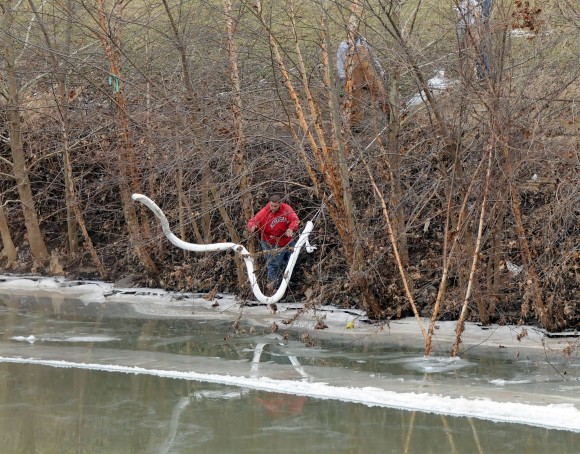West Virginia’s Governor sees the “light at the end of the tunnel” in the chemical leak that has compromised water service for about 300,000 in the state.
Residents face a fifth day without drinking water as state and water authority officials said tests showed contamination levels low enough for it to soon to be safe for consumption. Testing in the last day found levels of the chemical below one part per million at the treatment facility, the cutoff point for officials to begin testing it around the state.
“Things are looking right,” Governor Earl Ray Tomblin, said in a press conference yesterday. “They’re trending in the right direction.”
Local restaurants such as Bluegrass Kitchen and chains and convenience stores were being allowed to reopen after having to shutter because of the contamination. The Kanawha-Charleston Health Department listed a dozen restaurants and more than 150 pharmacies, grocery stores and other food shops that conditionally reopened as of yesterday at 12:30 p.m. Water use was banned Jan. 9, effecting customers in and around the capital of Charleston.
Businesses could apply to resume operating, a process that included a Kanawha-Charleston Health Department review of the company’s emergency potable water plans and site visit.
Bluegrass Kitchen, a Charleston farm-to-table restaurant that can seat about 90, closed the evening of Jan. 9 and reopened for lunch yesterday.
“It’s been detrimental,” said Keeley Steele, the restaurant’s owner. “That’s a huge chunk of money.”
Bottled Water
The restaurant relied on five-gallon bottles of water it bought from local stores and is scheduled to receive additional supplies today, Steele said. Since employees can’t use the commercial dishwasher, Bluegrass Kitchen is also using a stash of disposable cutlery and glassware from its catering business.
“I’ve never had an expensive vodka martini out of a plastic glass, but I’m guessing we’re going to sell some tonight,” Steele said in a telephone interview yesterday.
On Jan. 9, state officials discovered a leak near the Elk River from a 35,000 gallon tank of 4-methylcyclohexane methanol, a little-known or studied chemical that is used to wash coal before it’s sent to power plants. About 7,500 gallons leaked from a one-inch hole, across the ground and into the river. Once the West Virginia division of American Water Works Co. discovered the contamination, it issued its largest-ever “do not use” order to customers in the area.
State of Emergency
The spill is one of the largest detected in years, and prompted President Barack Obama to declare a state of emergency for the affected counties. The federal government has sent 1.4 million liters of water to the region, which is being distributed by the National Guard and local churches and schools.
Supermarket shelves in the region were being emptied of bottled water, and local residents were using social media to alert others to stores that had been restocked or to hotels and gyms offering free showers.
The chemical leak from the tank at Freedom Industries Inc. was discovered on the morning of Jan. 9. With local residents reporting a licorice odor, Mike Dorsey, head of the West Virginia Department of Environmental Protection homeland security office, said smelling the chemical isn’t dangerous.
West Virginia hospitals have admitted 10 patients with non- life threatening conditions linked to the leak and treated and released 169 patients from emergency rooms, state Department of Health and Human Resources Secretary Karen Bowling said at the press conference yesterday.
Tanks Drained
Closely held Freedom Industries, based in Charleston, has since drained the tank and state regulators ordered the company to empty all 14 of its above-ground storage tanks and prepare a cleanup plan for the site.
U.S. Attorney Booth Goodwin said his office, along with other federal and state law-enforcement authorities, will investigate the cause of the leak and “take whatever action is appropriate.”
Freedom Industries President Gary Southern apologized for the spill, saying the company was working with state and federal officials. The company, formed in 1986, supplies chemicals to the steel, cement and coal-mining industries, including agents that deep freeze, treat water or control dust, according to its website.
“We have mitigated the risk in terms of further” contamination, Southern said at a news conference Jan. 11. “This incident is extremely unfortunate, unanticipated, and we are very, very sorry.”
West Virginia’s environment department told the company to submit a proposal for cleaning up contaminated soil and groundwater, along with a plan for disposal of the chemicals in the tanks, according to an agency statement.
The American Association of Poison Control Centers said in a statement that 4-methylcyclohexane methanol can be harmful if swallowed or inhaled and can cause eye and skin irritation as well as nausea and vomiting.
–Editors: Carlos Torres, David Ellis
Topics Virginia Pollution Chemicals West Virginia
Was this article valuable?
Here are more articles you may enjoy.



 Marsh McLennan Agency to Buy Fisher Brown Bottrell for About $316M
Marsh McLennan Agency to Buy Fisher Brown Bottrell for About $316M  FBI Says Chinese Hackers Preparing to Attack US Infrastructure
FBI Says Chinese Hackers Preparing to Attack US Infrastructure  Jury Awards $80M to 3 Former Zurich NA Employees for Wrongful Termination
Jury Awards $80M to 3 Former Zurich NA Employees for Wrongful Termination  North Carolina Adjuster and Son Charged With Embezzlement in Roof Jobs
North Carolina Adjuster and Son Charged With Embezzlement in Roof Jobs 

